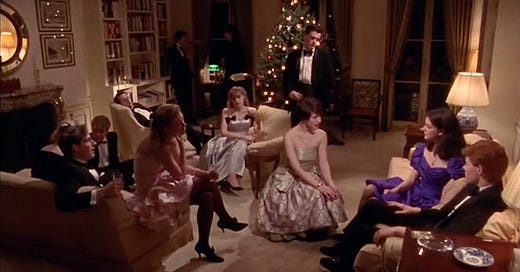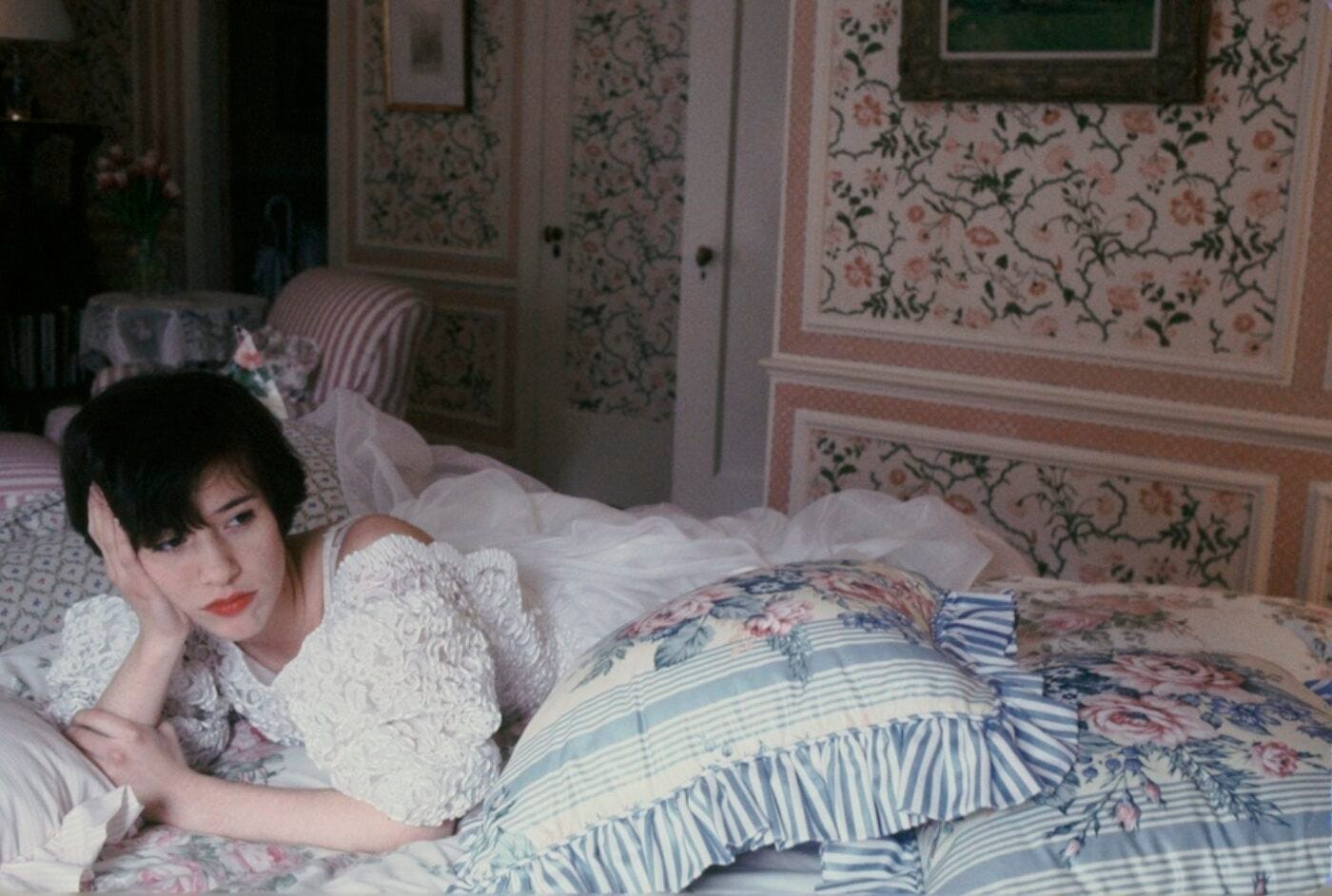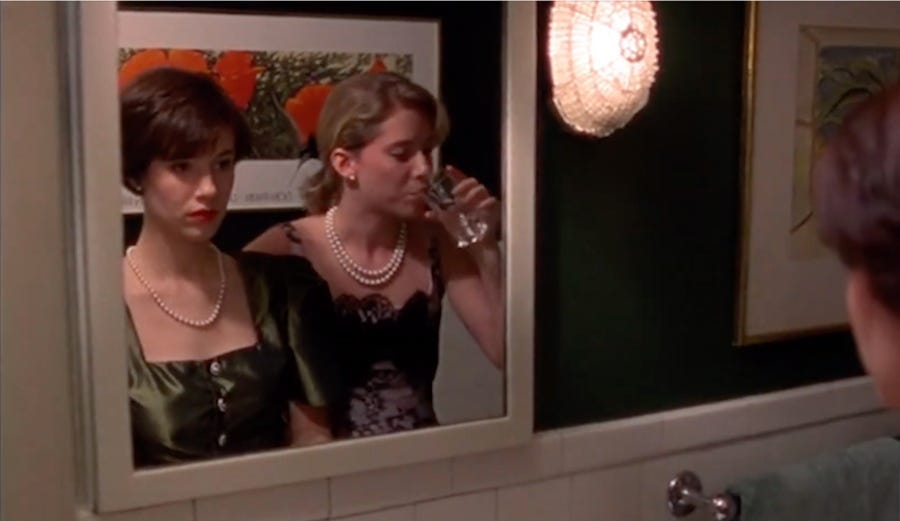Clearing out my bedroom wardrobe, I came across my double-breasted dinner jacket as worn in my teenage years, stained, torn and peppered with burns from Sobranie cocktail cigarettes. A relic of endless charity balls: The Feathers, The Bluebird, The Blizzard, The Snow Ball, The Cinderella, The Roller Ball, The Titanic: a sea of teenage angst and taffeta; anxious mothers and affable fathers talking career prospects in Carlyle Square drawing-rooms before the main event; a polite contrast to the writhing snog-fest to follow. All this was chronicled by Dafydd Jones, whose photographs of London’s teenage balls (1980-1988) have passed into legend. My wife, Venetia (she will kill me for mentioning this), stars, inadvertently, in perhaps Jones’ most famous photograph, taken at The Feathers in 1981 and later published in Tatler. She had no idea it was being taken at the time. It was pitch black, and the participants had other, more important things to think about.
Whit Stillman’s Metropolitan (1990) captures the zeitgeist, albeit from the other side of the Atlantic. Oh, how I adore Metropolitan! The wit of Whit. As dry as a bone. It HAS to be the ultimate Christmas film. One of my all-time favourites. One to watch over and over again. Of course, we all have our own Christmas films. Personal favourites. America’s keen on It’s a Wonderful Life (1946), a film which flopped at the box office but has grown in popularity over the years. In Britain, the same thing is happening with Love Actually (2003), a gooey, awkward anthology, a Temple to Cringe rescued by a moving performance from Emma Thompson. For others, it’s a retreat to the nursery and time to dig out The Railway Children (1970), which we covered a few days ago; The Amazing Mr Blunden (1972) or Mary Poppins (1964). But I have two, year-in, year-out, Christmas picks: Richard Williams’ Oscar-winning animation, A Christmas Carol (1971) and Metropolitan (1990), best described as an upper-class comedy of manners — a Jane Austen for the late Eighties.
Oh, how I love this film! I’ve seen it countless times; I can recite the script (Whit Stillman won an Oscar nomination for ‘Best Original Screenplay’) by heart. Set ‘not so long ago’, at the fag-end of the New York deb scene, The Sally Fowler Rat Pack — a select group of precocious nineteen-year-olds, fresh from their various boarding schools and in their first year at Ivy League universities — attend a series of balls and private ‘after-parties’ in their parents’ snazzy Upper East side apartments over Christmas. And Mein Gott, does the SFRP like to talk. All this is very much my kind of film: cigarettes, cocktails, witty and amusing put-downs, a conversation piece set in gorgeous Park Avenue apartments where nothing much happens — more Rattigan than Rambo, more Coward than Creature from the Black Lagoon.
Stillman shot Metropolitan on a shoestring, with an untried cast and crew, selling his flat for $50,000 to part-finance it, borrowing friends’ houses and Park Avenue lobbies to create the illusion of Upper East side apartments. And it looks elegant, shot on 16mm (blown up to 35mm), even if the murky lighting and muffled sound — the street scenes shot on natural light — add to its considerable charm. Like Woody Allen, Stillman’s imagined New York is the Manhattan we all know and love, even if, in reality, like a foggy, gaslit London, the truth sometimes doesn’t quite bear out: The 21 Club, Scribner’s bookshop and A. T. Harris (all defunct), The Rockefeller Center Christmas tree and The St. Regis Hotel, carols at St. Thomas Church, Fifth Avenue.
Whit Stillman based Metropolitan on his own personal experience — the deb circuit of the late 1960s — the period in which Stillman intended the film to be set, or at least in spirit, although lack of money (apart from a black and white television set, a vintage Checker Cab and the odd parked car or two) places the film, visually, at least, firmly in the late 1980s. Several Metropolitan fans have been in touch about this: “Really?” “Is this right?” “But surely Metropolitan is set in the 1980s?” Well, yes. It is. Sort of. But bear in mind that some of our favourite Metropolitan characters, Audrey (Carolyn Farina), Charlie (Taylor Nichols) and Sally (Dylan Hundley), make a reappearance — ten years in their time — in The Last Days of Disco (1998), which is most definitely set in the very early 1980s. Studio 54 and all that. Which reminds me to mention Metropolitan's amusing soundtrack (by Tom Judson and Mark Suozzo), performed by the Metropolitan Light Orchestra (or similar) — a swinging accompaniment in light jazz. Critics never seem to take soundtracks seriously, which is a shame, as music can make or break a film.
Whit nails it. It's like being a nineteen-year-old all over again: the intrigue, the pretence, the jealousies, the insecurity, the intellectual posturing, the jostling for position — when somebody can be your greatest friend for two weeks, and then never heard of again. From a British perspective, American conversation — and manners — are, of course, more formal and far more intense. Forget earnest discussions on the merits of Mansfield Park or the French socialist philosopher Charles Fourier; British 'friends' were more likely to pelt you with generous dollops of Charlotte Russe. Or let off a fire extinguisher. Or dance on the mahogany table. But the sensibilities of the British Sloane Ranger and the American Prepster meet in so many ways: 'what really matters': to cry at carols, where five years at boarding school makes you sophisticated and seemingly self-confident beyond your years, when the death of your dog hurts more than your grandfather's demise.
Stillman's two subsequent films, Barcelona (1994) — a Jamesian take on Americans in Europe — and The Last Days of Disco (1998), best described as 'Northanger Abbey hits Studio 54', form a loose trilogy, alongside Metropolitan. Metropolitan's anti-hero, Nick Smith, played in three terrific performances by Chris Eigeman (renamed in the last two films, but essentially the same character), steals the show with his pithy, throwaway quips. And, for now, I will leave you with one of the best:
“Rick von Sloneker is tall, rich, good looking, stupid, dishonest, conceited, a bully, liar, drunk, and thief, an egomaniac and probably psychotic. In short, highly attractive to women.”
Metropolitan (1990) is available to watch via DVD and Blu-ray, although, currently, there appears to be no digital download in the UK. I suspect this may differ in America. The Criterion Collection’s ‘Director Approved Special Edition’ DVD is the one to get, featuring the Pierre Le-Tan cartoon on the cover (just like The New Yorker), a high-definition digital transfer and audio commentary from director Whit Stillman and Metropolitan stars, Chris Eigeman and Taylor Nichols.
And having bought Mark C. Henrie’s Doomed Bourgeois in Love: Essays on the Films of Whit Stillman (2001), I’m now eyeing up Whit Stillman: Not So Long Ago, a collection of essays and film criticism, published by the Fireflies Press last year. For Stillman completists, the script of Metropolitan is available in paperback, published by Faber. And Whit’s novelisation of The Last Days of Disco, with a choice dust jacket design by Pierre Le-Tan, With Cocktails at the Petrossian Afterwards, was published by Farrar Straus & Giroux in 2000.
Right. Where are we? That was Film Recommendation No. 107. As always, Sunday's post is for everybody: for both the paid subscribers and the free subscribers. I hope you enjoyed it. But upgrading to the paid subscription gives you an extra film recommendation every Friday morning and access to the complete archive. So, something to think about. I'll be back on Friday (for the paid subs). Not sure what I'm going to write about, but I need to start it today as Christmas is catching up with us and I’m running out of time. I've already drawn up a list of the films we'll cover in the New Year, and there are some crackers in the offing.
If ever there was a film to watch with a Dry Martini, it's Metropolitan (1990). Stirred not Shaken, please. 007 is harbouring a dangerous delusion. But if this is the first time you’ve seen it, I hope that you will fall in love with it too. Happy Christmas! And ciao.












Terrific. Not quite sure how this one passed us by, Luke!
Wishing you and yours a happy christmas from us both 🥂
An evocative recommendation to pause on and consider over Christmas. Thank you!
The eighties are another country, but unlike The Go-Between, it's a country I visited and indeed lived some formative years in.